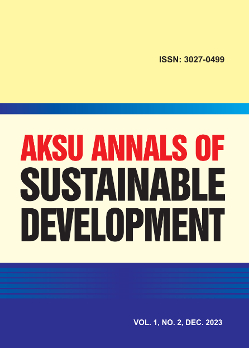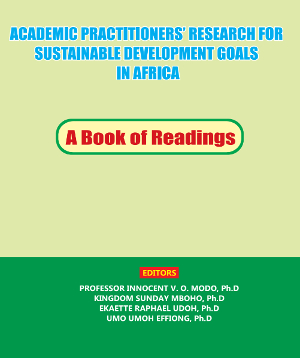ONE HEALTH STRATEGIC PLAN AND VETERINARY ADMINISTRATION IN AKWA IBOM STATE, NIGERIA
DOI:
https://doi.org/10.60787/aasd.vol3no1.67Keywords:
One Health Strategy, Veterinary Administration, Akwa Ibom StateAbstract
A comprehensive approach to public health is required in light of the ongoing problems caused by illnesses that are spread from animals to people, known as zoonotic infections, antibiotic resistance, food safety issues, and shortcomings in veterinary laws. The One Health Strategic Plan has been identified as a crucial framework for tackling these issues as it unifies environmental, animal, and human health. Its efficiency in Akwa Ibom State is still mainly unknown, though. This research looks at how the One Health Strategic Plan has affected Akwa Ibom State's veterinary laws, veterinary education, food safety, zoonotic disease prevention, and antibiotic resistance. Using a survey research approach, the study's 2,357,418 population is based on Akwa Ibom State's 2023 registered voters. A basic random sampling approach was used to guarantee an impartial selection of the general public, and 350 responses were obtained for analysis from the sample size of 384, which was established using Krejcie and Morgan's table. Both primary and secondary sources of information were used. The chi-square statistical tool was used for hypothesis testing, and basic percentage approaches were used for response analysis. The Systems and Institutional Theory serves as the foundation for the research. The One Health Strategic Plan was shown to have a good effect on food safety, zoonotic disease prevention, antibiotic resistance control, enforcement of veterinary laws, and veterinary education. According to the report, regulatory bodies should police antimicrobial misuse, zoonotic disease surveillance should be strengthened, and the Akwa Ibom State government should improve food safety regulations. There should also be effective enforcement of veterinary regulations by state authorities, and veterinary education forums should include One Health ideals into their discussions.
Downloads
References
Akpakpan, M.S., Ebong, E.A., and Ndaeyo, E.A. (2025). Bureaucratic Governance and Socioeconomic Devvelopment in Nigeria: Analyzing the Interplay between Administrative Efficiency and Public Sevice Delivery. MSI Journal of Multidisciplinary Research, 2(7), 1-26
British Veterinary Association (BVA). (2021). The role of VETERINARY services in animal welfare and public health. BVA Journal, 34(2), 45-60.
Buncic, S., & Sofos, J. (2012). Interventions to control Salmonella contamination during poultry, cattle and pig slaughter. Food research international, 45(2), 641-655.
Effiong U., Udoyen G., and Udoh, E. (2021). Ecological Determinism and Prospects of Ecotourism Development in the Niger Delta, Nigeria. AKSU Journal of Social Sciences, 1(1), pp: 275-286.
Ekanem, M. E., & Essien, J. O. (2019). Zoonotic disease prevention and the role of veterinary services in Akwa Ibom State. Journal of Public Health Research, 10(2), 34-45.
Ekong, P. S., & Udoh, A. B. (2020). Veterinary infrastructure and public health in Nigeria: A case study of Akwa Ibom State. African Journal of Veterinary Science, 15(1), 22-33.
FAO. (2020). The One Health Approach and Its Importance in Zoonotic Disease Control. Food and Agriculture Organization of the United Nations.
Ibanga, S. I., Atairet, C. A., and Atakpa, O. E. (2024). Fouth Industrial Technologies and Service Delivery in Akwa Ibom State University, Nigeria. AKSUJOCOG, 4, pp: 176-185.
Ibok, E. E., and Ibanga, S. E. (2014). The Important of Human Capital Development and Economic Empowerment on the Socioeconomic Development of Akwa Ibom State, Nigeria. Global Journal of Human Resource Management, 2(3), pp: 37- 44.
OIE (World Organisation for Animal Health). (2019). The role of Veterinary services in global health and animal welfare. OIE Scientific and Technical Review, 38(1), 21-37.
OIE (World Organisation for Animal Health). (2019). Veterinary research and its role in global health security. OIE
Scientific and Technical Review, 38(1), 21-37.
Okeke, L. O., Adeyemi, S. A., & Uche, F. I. (2021). Challenges of Veterinary services in Nigeria: A One Health perspective. Nigerian Journal of Veterinary Medicine, 12(2), 45-59.
O'Neill, J. (2016). Tackling drug-resistant infections globally: final report and recommendations. Wellcome Trust. https://amrreview.org/sites/default/files/160518_Final%20paper_with%20cover.pdf
Rushton, J., Huntington, B., Gilbert, W., & Herrero, M. (2018). One Health economics: A systematic review of ecosystem-health-economy interdependencies. EcoHealth, 15(4), 589–599. https://doi.org/10.1007/s10393-018-1354-9
Schneider, M. C., Aguilera, X. P., Silva, J. B., Ault, S. K., Najera, P., Martinez, J., & Requejo, R. (2020). One Health and emerging
infectious diseases: Strengthening the linkages between human, animal, and environmental health. Revista Panamericana de Salud Pública, 44, e56. https://doi.org/10.26633/RPSP.2020. 56
Udoh, E. R. and Mboho, K.S. (2021). Community Development and Socio- Economic Well-being of Rural Dwellers in Nigeria: Problem and Prospect. AKSU Journal of Social Sciences (AJSS), 2(1), pp: 14-27.
Udoikah, J. M., and Ndaeyo, E. A. (2021). Small and Medium Enterprises (SMEs) and the Economic Growth of Nigeria. AKSU Journal of Administration and Corporate Governance, 1(1), pp: 152- 161.
World Health Organization. (2019). Taking a multisectoral one health approach: a tripartite guide to addressing zoonotic diseases in countries. Food & Agriculture Org.
Downloads
Published
Issue
Section
License
Copyright (c) 2025 AKSU Annals of Sustainable Development

This work is licensed under a Creative Commons Attribution-NonCommercial-NoDerivatives 4.0 International License.
Manuscript content on this site is licensed under Creative Commons Licenses. Authors wishing to include figures, tables, or text passages that have already been published elsewhere are required to obtain permission from the copyright owner(s) for both the print and online format and to include evidence that such permission has been granted when submitting their papers. Any material received without such evidence will be assumed to originate from the authors.





 ICIDR Publishing House
ICIDR Publishing House